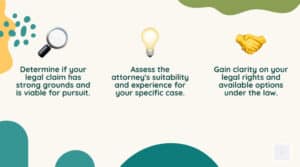What Is a Free Legal Case Evaluation and Why Is It Important?

When someone faces a legal issue, they often feel unsure where to turn. They might have questions about their rights or potential claims. This is especially true after an injury or an unfair situation. A free legal case evaluation offers a clear path forward. It is a no-cost way to get initial legal advice. This first step helps people understand their options without risk.

This guide will explain what a free legal case evaluation is. It will show why it is so important. Readers will learn how to prepare for an evaluation. They will find what happens during and after it. The article will also address common questions and concerns. It aims to empower individuals to seek justice.
A free legal case evaluation is an initial consultation provided by a law firm or attorney to a prospective client, typically without any charge. During this evaluation, the attorney reviews the basic facts and circumstances of an individual’s situation to determine if there are sufficient grounds to pursue a legal claim. It serves as a crucial first step for anyone considering legal action, offering an opportunity to gain clarity and understanding without financial commitment. This initial assessment is designed to help both the potential client and the attorney decide if there is a viable case and if the firm is the right fit to handle it.

The importance of a free legal case evaluation cannot be overstated. For individuals who have suffered harm or are facing complex legal challenges, the legal system can seem daunting and inaccessible. Many people hesitate to seek legal advice due to concerns about costs or a lack of understanding of their rights. A free evaluation removes these barriers, providing a risk-free avenue to explore legal options. It empowers individuals to make informed decisions about their future, armed with professional insights.
The Core Purpose of an Evaluation
The primary purpose of a free legal case evaluation is multi-faceted. First and foremost, it allows an attorney to assess the legal merits of a potential claim. This involves examining the facts, identifying applicable laws, and determining if there’s a reasonable chance of success if a lawsuit were to be filed. Attorneys look for key elements such as damages (the harm suffered), causation (a direct link between someone else’s actions and the harm), and negligence or wrongdoing on the part of another party. For a deeper understanding of legal terms like “damages,” resources such as Cornell Law School’s Legal Information Institute provide comprehensive definitions (see: damages).
Beyond assessing legal viability, the evaluation helps potential clients understand their legal options. An attorney can explain the various paths available, such as negotiation, mediation, arbitration, or litigation. They can also provide an initial estimate of the potential compensation or relief that might be sought. This helps individuals set realistic expectations and understand the potential scope and duration of a legal process. It’s an opportunity for a potential client to gain an expert opinion on whether their situation warrants legal intervention and what that intervention might entail.
Key Benefits for Potential Claimants
Engaging in a free legal case evaluation offers several significant benefits:
- Clarity on Legal Standing: Many individuals are unsure if their situation constitutes a legal case. An evaluation provides professional insight, clarifying whether they have a legitimate claim under the law.
- Informed Decision-Making: With an attorney’s assessment, individuals can make well-informed decisions about whether to pursue legal action, what resources might be required, and what the potential outcomes could be.
- Access to Legal Expertise: It offers a direct line to an experienced legal professional who can analyze complex situations, identify legal precedents, and offer strategic advice custom to the specific circumstances.
- Peace of Mind: Knowing whether one has a case, or understanding why they might not, can bring significant peace of mind. It alleviates the stress and uncertainty often associated with legal dilemmas.
- No Obligation: Crucially, a free evaluation does not obligate the individual to hire the firm. It’s a no-pressure environment to explore possibilities and determine the best course of action. This zero-risk approach makes legal advice accessible to a wider audience. Many law firms, like those listed on legal directories, emphasize the no-obligation aspect of their initial consultations (e.g., Botsford & Roark).
Common Case Types Eligible for Evaluation
While the concept of a free case evaluation is broad, it is most commonly offered in areas of law where attorneys often work on a contingency fee basis, meaning they only get paid if they win the case. This model aligns perfectly with the “free evaluation” concept, as the firm is assessing the potential for a successful outcome that would eventually cover their fees.
Some of the most common types of cases eligible for a free evaluation include:
- Personal Injury: This is perhaps the most prevalent area. It encompasses injuries sustained due to another party’s negligence, such as:
- Car Accidents: Collisions resulting in injuries.
- Motorcycle Accidents: Injuries specific to motorcycle incidents.
- Truck Accidents: Accidents involving commercial trucks.
- Slip and Fall Accidents: Injuries from hazardous conditions on property.
- Medical Malpractice: Harm caused by healthcare provider negligence.
- Workplace Injuries: Injuries occurring on the job, often involving third-party negligence.
- Wrongful Death: Cases where a death is caused by another’s negligence or misconduct.
- Product Liability: Injuries caused by defective or dangerous products.
- Employment Law: Cases involving workplace discrimination, sexual harassment, wrongful termination, or unpaid wages. Many firms specializing in employee rights offer free evaluations to determine if an employee’s rights have been violated.
- Mass Torts/Class Actions: These involve large groups of people harmed by the same product, event, or entity, such as defective medical devices or pharmaceutical drugs. Firms handling these complex cases almost always start with a free evaluation to identify eligible claimants. For instance, firms handling claims related to specific issues like talcum powder or Tepezza infusions often provide free evaluations (e.g., Parker Waichman LLP).
The demand for these evaluations is significant. Law firms across the country receive thousands of inquiries daily from individuals seeking guidance on potential legal claims, underscoring the widespread need for accessible initial legal advice.
The Evaluation Process: What to Expect from Start to Finish
Once you decide to pursue a free legal case evaluation, understanding the typical process can help alleviate anxiety and ensure you make the most of the opportunity. The process generally involves initial contact, a detailed consultation, attorney assessment, and communication of the outcome.

Thorough preparation is key to a productive case evaluation. The more organized and complete the information you provide, the better an attorney can assess your situation. Consider gathering the following documents and information:
- Police Reports or Incident Reports: If your case involves an accident or crime, these reports provide crucial initial details.
- Medical Records and Bills: Documentation of your injuries, diagnoses, treatments, and associated costs is vital, especially for personal injury claims.
- Witness Information: Names and contact details of anyone who witnessed the incident.
- Insurance Correspondence: Any communication, policy numbers, or claim details related to insurance companies involved.
- Photographs or Videos: Visual evidence of the scene, injuries, or property damage can be incredibly powerful.
- Timeline of Events: A chronological summary of what happened, including dates, times, and locations. This helps the attorney quickly grasp the sequence of events.
- Lost Wage Documentation: If your injury led to time off work, collect pay stubs or employer statements detailing lost income.
- Any Other Relevant Documents: This could include contracts, emails, text messages, or anything else pertinent to your specific situation.
The goal is to provide a clear and concise picture of your situation. While you might not have every document, bringing what you do have will significantly aid the attorney’s assessment. For a comprehensive checklist, this Free legal case evaluation guide offers a detailed breakdown.
What Happens During the Consultation
The consultation typically begins with you sharing your story. The attorney will listen carefully as you explain what happened, the harm you suffered, and any other relevant details. Be prepared to answer questions from the attorney, who will probe for specific facts, dates, and circumstances necessary for their legal analysis. They might ask about:
- The exact date, time, and location of the incident.
- Who you believe was at fault and why.
- The nature and extent of your injuries or damages.
- Any medical treatment you’ve received or are currently undergoing.
- How the incident has impacted your life, including work, daily activities, and emotional well-being.
Following your narrative and their questions, the attorney will conduct an initial attorney analysis. They will apply their legal knowledge to your facts, identifying potential legal theories, strengths, and weaknesses of your case. This is where their expertise in tort law or other relevant legal fields comes into play. They will then engage in a discussion of case strength, providing their preliminary opinion on whether you have a viable claim. They might explain relevant laws, potential challenges, and what a realistic outcome could look like. This phase is crucial for understanding the attorney’s perspective and their initial assessment of your chances of success.
Questions You Should Ask the Attorney
A free case evaluation is also your opportunity to evaluate the attorney and the firm. Don’t hesitate to ask questions that will help you make an informed decision about potential representation. Here are some key questions to consider:
- Attorney Experience: “How long have you been practicing law, specifically in this area (e.g., personal injury, employment law)?”
- Similar Cases Handled: “Have you handled cases similar to mine before? What were the outcomes?”
- Fee Structure: “How do you charge for your services if you take my case? (e.g., contingency fee percentage, what expenses are covered?)”
- Case Strategy: “Based on what I’ve told you, what would be your initial strategy for my case?”
- Communication Frequency: “How often can I expect updates on my case, and what is the best way to communicate with you or your team?”
- Potential Outcomes: “What are the possible outcomes for a case like mine, and what are the potential challenges?”
- Firm Resources: “What resources does your firm have to handle a case like mine (e.g., investigators, expert witnesses)?”
- Timeline: “What is a realistic timeline for a case like this?”
Asking these questions helps you gauge the attorney’s expertise, their approach to client communication, and their overall suitability for your specific legal needs. It’s a two-way street where both parties assess the potential for a successful working relationship.
Key Legal Considerations and Common Misconceptions
Navigating free legal case evaluations requires understanding certain legal principles and debunking common myths. This ensures potential clients approach the process with realistic expectations and a clear understanding of their rights and obligations.

Is the Evaluation Truly Free? Understanding Contingency Fees
One of the most common questions is, “Is a free case evaluation truly free?” The answer, in most instances, is yes. The initial consultation itself carries no upfront cost or obligation. This means you won’t be charged for the time spent discussing your case during the evaluation.
However, it’s crucial to understand how law firms that offer free evaluations typically operate if they take on your case. Many, especially in personal injury and certain other areas, work on a contingency fee basis. This is often summarized by the phrase “no-win, no-fee” or “fee is free unless you win.”
Under a contingency fee arrangement:
- Attorney Payment from Settlement: The attorney’s fees are a percentage of the compensation you receive if they successfully resolve your case through a settlement or a court verdict. If you don’t win, the attorney doesn’t get paid their legal fees.
- Case Expenses vs. Legal Fees: It’s important to distinguish between legal fees and case expenses. While legal fees are contingent, clients may still be responsible for certain out-of-pocket case expenses (e.g., court filing fees, expert witness fees, deposition costs) regardless of the outcome. However, many firms will advance these expenses and only seek reimbursement from the settlement or verdict. Always clarify this during your evaluation.
This model makes legal representation accessible to individuals who might not otherwise afford hourly legal fees, ensuring that justice is not solely for the wealthy. It also incentivizes the attorney to pursue the strongest possible outcome, as their payment is directly tied to your success.
Confidentiality vs. Attorney-Client Privilege
During a free legal case evaluation, you will likely share sensitive and personal information. It’s natural to wonder about the privacy of this information.
- Information Privacy: Reputable law firms operate under strict ethical obligations to maintain the confidentiality of all information shared during an initial consultation, even if you don’t end up hiring them. This means they cannot disclose your information to outside parties without your consent.
- Attorney-Client Privilege: While confidentiality applies broadly, the full attorney-client privilege typically forms when an attorney-client relationship is formed. This relationship is generally established when you formally agree to retain the attorney’s services, often through a signed fee agreement or retainer. This privilege legally protects communications between you and your attorney, making them inadmissible in court without your consent.
Even before a formal relationship is established, the information you share for the purpose of seeking legal advice is generally treated as confidential. However, it’s always wise to confirm the firm’s confidentiality policy during your evaluation. It’s a standard practice for law firms to explicitly state that the initial evaluation does not create an attorney-client relationship, but that the information shared remains confidential. This is a critical distinction, as highlighted by various legal resources (e.g., USLegal’s Q&A).
Common Misconceptions About a Free Legal Case Evaluation
Several myths surround free legal case evaluations that can deter individuals from seeking this valuable resource:
- Myth: It obligates you to hire the firm.Reality Check: This is false. As discussed, a free evaluation is a no-obligation assessment. You are free to walk away, seek other opinions, or decide not to pursue legal action.
- Myth: It guarantees a lawsuit.Reality Check: An evaluation determines if you have a case and if it’s worth pursuing. It does not mean a lawsuit will automatically be filed. Many cases are resolved through negotiation or settlement without ever going to court.
- Myth: It’s only for clear-cut cases.Reality Check: Attorneys are trained to identify nuances and potential legal arguments even in complex or seemingly ambiguous situations. Many strong cases begin with an individual who wasn’t sure if they had a claim at all. The very purpose of the evaluation is to clarify the legal standing of your unique circumstances.
- Myth: The lawyer will work for free if they take my case.Reality Check: While the evaluation is free, the actual legal representation for your case is not. If the firm takes your case on a contingency basis, they will earn a percentage of your recovery. If they charge hourly, you will pay for their time. The “free” aspect applies only to the initial assessment.
- Myth: My information isn’t safe.Reality Check: As noted, reputable law firms are bound by ethical duties of confidentiality. Your information is protected, even if no formal attorney-client relationship is formed.
Understanding these distinctions allows individuals to fully leverage the benefits of a free legal case evaluation without unnecessary apprehension.
Frequently Asked Questions about Free Legal Evaluations
Beyond the core aspects, prospective clients often have practical questions about the logistics and implications of a free legal case evaluation.
How long does a typical case evaluation take?
The duration of a free case evaluation can vary significantly depending on the complexity of your situation and the firm’s process.
- Initial Call/Online Form: Many firms start with a brief phone call (5-15 minutes) or an online intake form (which you might complete in 10-20 minutes). This initial step gathers basic information to determine if your case aligns with the firm’s practice areas and if a more in-depth consultation is warranted. Some firms even offer online quizzes for a preliminary assessment (e.g., Scranton Law Firm’s quiz).
- In-Person/Virtual Meeting: If the initial screening suggests a potential case, a more comprehensive consultation might be scheduled. This could be an in-person meeting at the law office or a virtual meeting via video conference. These deeper dives can last anywhere from 30 minutes to an hour or even longer, especially for complex cases involving numerous details or extensive documentation.
- Follow-Up Time: After the consultation, the attorney may need additional time to review documents, conduct preliminary research, or consult with colleagues. The firm will then communicate their decision on whether they can take your case. This follow-up can range from a few hours to several days, depending on the firm’s workload and the intricacy of the case.
It’s always best to ask the firm how long they anticipate the evaluation process will take when you first contact them.
What happens if the law firm decides not to take my case?
It’s a common outcome for law firms to decline a case after a free evaluation. This is not necessarily a reflection on the validity of your claim but rather on whether it fits the firm’s specific criteria or resources.
Common reasons for rejection include:
- Lack of Merit: The attorney determines that, based on the facts and applicable law, there is insufficient legal basis to pursue a claim, or the chances of success are very low.
- Conflict of Interest: The firm may have represented an opposing party in the past, or there might be another ethical conflict preventing them from taking your case.
- Case Value: The potential financial recovery might be too low to justify the time and resources required to pursue the case, especially for firms working on a contingency fee basis.
- Statute of Limitations: The deadline for filing a lawsuit (the statute of limitations) may have already passed.
- Firm Specialization: The case might fall outside the firm’s specific area of expertise. For example, a personal injury firm wouldn’t take a divorce case.
- Resources/Workload: The firm might simply have too many active cases or lack the specific resources needed for a particular complex claim.
If a firm declines your case, they often provide a brief explanation. They might also offer referrals to other attorneys or firms that might be a better fit for your specific type of case. Additionally, they might suggest exploring legal aid resources if your income qualifies you for free or low-cost legal assistance (e.g., Lubbock Legal Aid). One firm’s rejection does not mean you don’t have a case; it simply means that firm cannot take it. You are free to seek other opinions.
Does a free evaluation mean the lawyer will work for free?
No, a free case evaluation absolutely does not mean the lawyer will work for free if they take on your full case. This is a critical distinction to understand.
- Evaluation vs. Representation: The “free” aspect applies only to the initial assessment phase, where the attorney determines if your case has merit and if they are willing to take it on. It’s a marketing tool and a service to potential clients.
- Contingency Fee Basis: As explained earlier, if the firm agrees to represent you, especially in personal injury cases, they typically do so on a contingency fee basis. This means their payment (a percentage of your settlement or verdict) is contingent upon winning your case. If they don’t win, they don’t get paid their legal fees. This is the “no-win, no-fee” model. You will, however, likely be responsible for case expenses, which are distinct from legal fees.
- Hourly or Flat Fee: For other types of cases (e.g., family law, business law), attorneys might charge an hourly rate or a flat fee. In these scenarios, the free evaluation is simply an initial meeting, and you would be responsible for all subsequent legal costs if you choose to retain the firm.
It’s essential to clarify payment terms for the full case during your evaluation. A reputable attorney will transparently explain their fee structure, including any contingency percentages, advanced expenses, and what happens if the case is unsuccessful. This ensures there are no surprises down the line.
Conclusion
A free legal case evaluation serves as an empowering first step for anyone facing a potential legal challenge. It provides a risk-free opportunity to gain professional insight into your situation, understand your legal rights, and determine the viability of pursuing a claim. By removing the initial financial barrier, it makes legal guidance accessible and helps individuals make informed choices about their future.
Whether you’re dealing with the aftermath of an injury, a workplace dispute, or another complex legal issue, taking advantage of a free case evaluation is a prudent decision. It offers clarity, peace of mind, and a clear path toward understanding your options. By preparing adequately, asking the right questions, and understanding the nuances of confidentiality and fee structures, you can maximize the benefits of this valuable service. A free legal case evaluation is your initial gateway to seeking justice and potentially securing the compensation you deserve.
To learn more about your legal options and how a dedicated legal team can help, we encourage you to explore resources that guide you through the process. Your journey towards justice can begin with a simple, no-cost conversation.
If you believe you have a case and are ready to take the next step, consider reaching out for a free evaluation today. Your path to understanding your rights and options starts here: Find out if you have a case.





